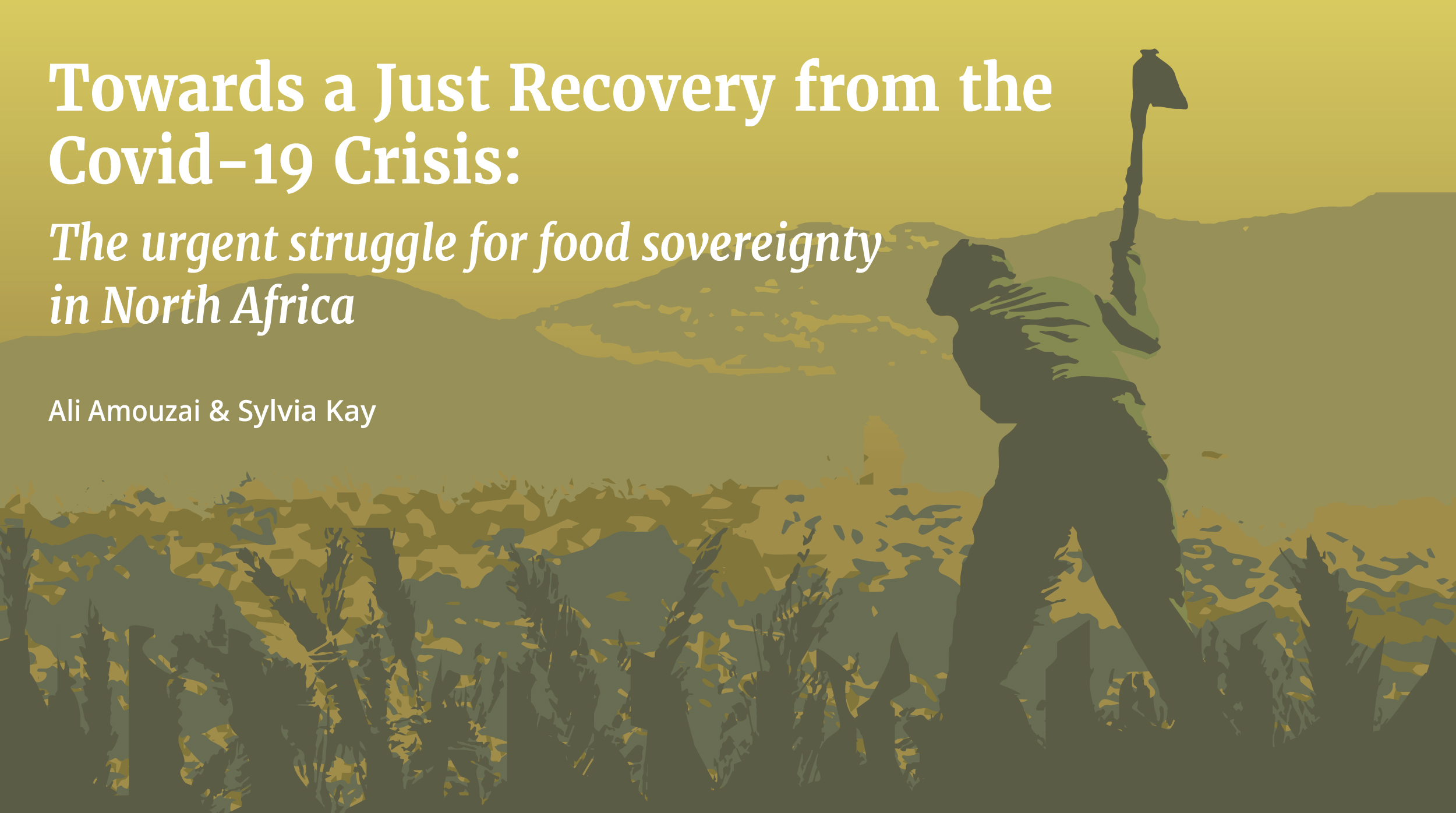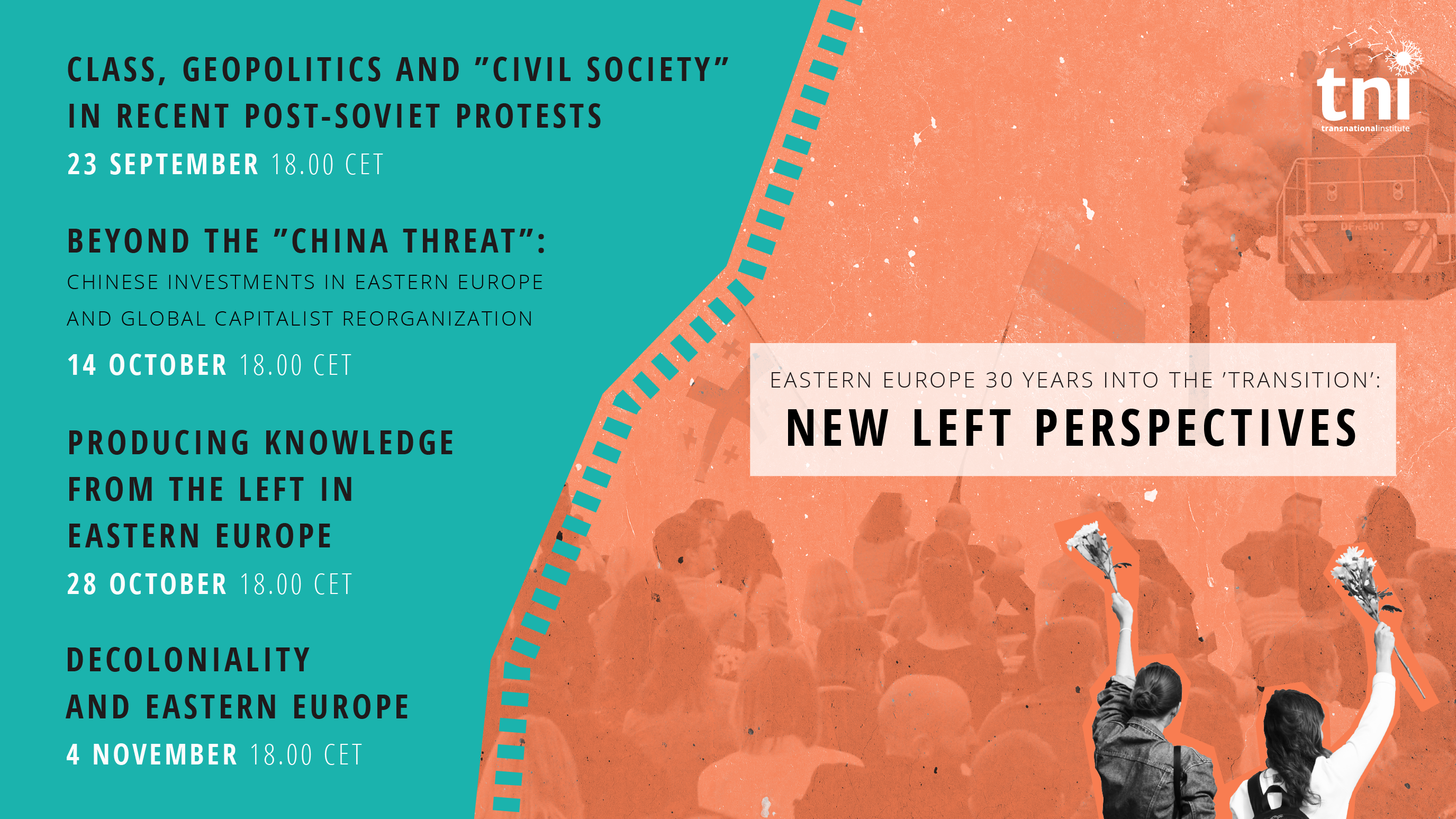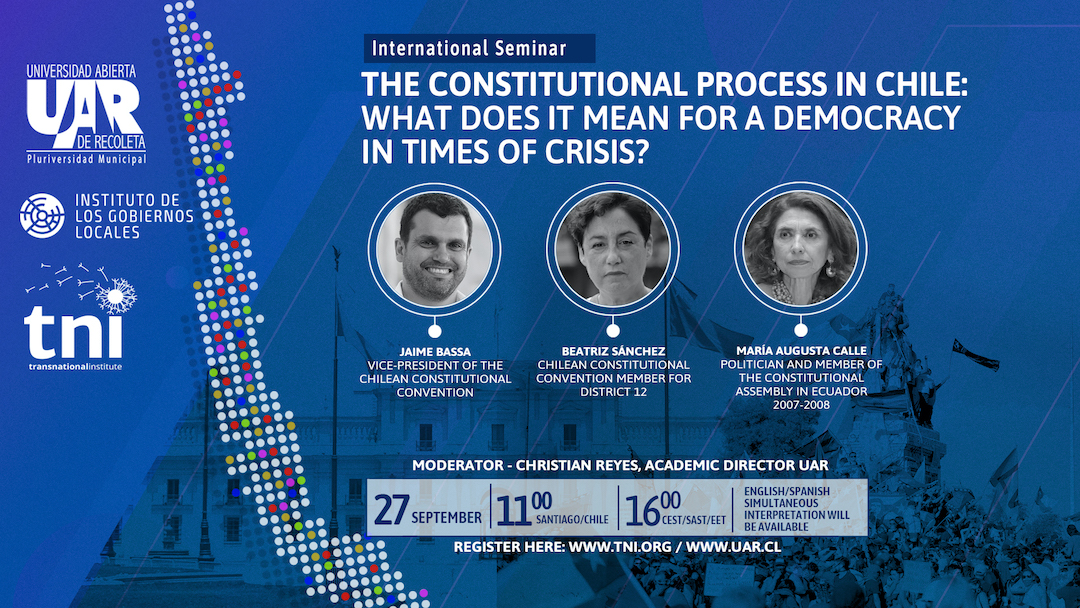|
Read up on our new report examining the intersections between Covid-19 and food systems across the North African region. Or join our new webinar series: 30 years into the ‘transition’ East European New Left Perspectives.
Was this forwarded to you? Sign up
here
|
|
Dear reader,
Our new report Towards a Just Recovery from the Covid-19 Crisis examines the intersections between Covid-19 and food systems across the North African region. It looks at how the dominant ‘food security’ paradigm increased vulnerability to the economic dislocation wrought by the pandemic. It examines the impacts of Covid-19, particularly on (rural) working people and small-scale food producers and how governments across the region responded to these challenges. Finally, it offers a pathway out of this moment of crisis rooted in models of food sovereignty and economic justice.

|
|
|
|
30 years into the ‘transition’: East European New Left Perspectives webinar series
 Three decades after the collapse of the Soviet bloc, the victorious narrative of postsocialist transition to liberal democracy, together with its less vigorous version of a flawed but diligent Europeanization, have fallen apart. Instead, the region features in international discussions as a site of new authoritarian populist regimes, new waves of of protests, and new economic ties with China as a rising global superpower – often interpreted as a negative example of global “democratic backsliding”.
Three decades after the collapse of the Soviet bloc, the victorious narrative of postsocialist transition to liberal democracy, together with its less vigorous version of a flawed but diligent Europeanization, have fallen apart. Instead, the region features in international discussions as a site of new authoritarian populist regimes, new waves of of protests, and new economic ties with China as a rising global superpower – often interpreted as a negative example of global “democratic backsliding”.
Organized around a new collection of analyses by a new generation of left thinkers in the region, this webinar series will bring to the limelight East European left perspectives on this transformation. The webinars will discuss some of the core issues that affect the region and regional left politics: the current wave of political upheaval in post-Soviet states, the impact and role of Chinese investments in the region, the conditions of left knowledge production, and the complex task of dealing with global coloniality from an East European position.
18:00 CET
30 years after the collapse of the Soviet Union, its emergent republics have dramatically changed their economic, ideological, political and cultural constitutions. This webinar will explore the complex social forces that have shaped the region, and interrogate the dynamics of class, geopolitics and “civil society” in new political protests in post-Soviet states, casting a new light on both the current ideological debates on the regions politics, and the contexts they are born from.
Speakers:
- Oleg Jouravlev (Public Sociology Laboratory, Saint Petersburg)
- Nino Khelaia (Georgian Institute of Public Affairs)
- Volodymyr Ischchenko (Technical University of Dresden)
Moderator:
Yuliya Yurchenko (University of Greenwich)
18:00 CET
In this second webinar we will look behind the “China threat” narrative, and attempt to contextualize Chinese investments in Eastern Europe as part of a broader global reorganization of capitalism and corresponding shifts in hegemonic power. We will ask how Eastern Europe-China relations impact on local accumulation regimes, how Chinese investments can be understood as part of global finance- and infrastructure-led development, and whether we can conceive China as an imperialist power.
Speakers:
- Linda Szabó (CEU, Budapest)
- Aleksandar Matković (Institute for Economic Sciences, Belgrade)
- Tamás Gerőcs (University of Binghamton)
Moderator:
Lela Rekhviashvili, Leibniz-Institut für Länderkunde, Leipzig
18:00 CET
Understanding Eastern Europe's postsocialist situation from a left perspective has been a major challenge for left politics in the region in recent decades. This third webinar will bring together speakers from organizations who produce knowledge from the left in Eastern Europe, to discuss how they address this challenge: what organizational models they use to resist academic, political and market pressures, and how they combine the task of analysis with that of organizing and building social power.
Speakers:
- Adela Hîncu (LeftEast)
- Kristina Andělová (Contradictions, Prague)
- Anastasia Riabchuk (Commons)
- Vladimir Simović (Center for Politics of Emancipation, Belgrade)
- Maria Cernat (Institute for Social Solidarity, Bucharest)
- Oleg Zhuravlev (Public Sociology Laboratory, Saint Petersburg)
- Vitalie Sprinceana (Platzforma, Chisinau)
Moderator:
Kristóf Nagy (Working Group for Public Sociology Helyzet/Fordulat, Budapest)
18:00 CET
In response to the failures of neoliberalism, Eastern Europe has seen a rise of nationalist movements and regimes promising salvation through asserting 'sovereignty'. In Hungary and Poland, these movements also deploy anti-colonial rhetoric against “foreign powers”. In the process, they obstruct any critical engagement with the region's own complex role in maintaining global colonial relations. The fourth and last webinar in this series will explore these dynamics and the strategies that have emerged on the left to address decolonization in the region. This webinar is in collaboration with Berliner Gazette (berlinergazette.de), as part of their BLACK BOX EAST project (blackboxeast.berlinergazette.).
Speakers:
- Eszter Kováts (ELTE University Budapest)
-
Andrzej W. Nowak (Adam Mickiewicz University)
- Veda Popovici (Essential Autonomous Struggles Transnational - EAST)
- Zoltán Ginelli (Transperiphery Movement)
Moderators:
Jose Miguel Calatayud and Magdalena Taube (Berliner Gazette)
27 September: The Constitutional Process in Chile – What does it mean for a democracy in times of crisis?
 What does a new constitutional process mean for a democracy that finds itself in crisis?
What does a new constitutional process mean for a democracy that finds itself in crisis?
This international seminar will address the political importance of a new constitutional process. It will look at the importance of a new constitution for a country, and that it is possible for a democracy in a state of social and political turmoil to draft a new charter of governing rules. The reasons behind why Chile finds itself in this position will also be analyzed, plus what it means for its citizens, and in particular, the leading role independents have taken in the Constitutional Assembly, instead of the country’s traditional political elite. The experiences lived by Bolivia and Ecuador will also be looked into, as both countries went through similar processes in 2006 and 2007, respectively.
|
|
|
|
|
|
|
|
In Zimbabwe, powercuts are nothing to talk about, and it is quite obvious that there is need for an energy solution. However, our guest on the program makes the case that building a 3 billion dollar power plant, financed with a loan from China, is not the solution to Zimbabwe’s energy woes. Not only is it a tragedy for the Tonga people, but also for the environment, for public health, and for long term sustainability and the country’s adherence to its climate change commitments.
Melania Chiponda is a Zimbabwean feminist activist and researcher. She is a land defender, and has been at the forefront of battles against extractivism in Zimbabwe and in the Southern African region in general. In her work with Just Associates Southern Africa (Jass), she has been involved in feminist movement building and feminist popular education around the extractives sector. She speaks about her work in Binga, in particular about the resistance to the proposed power plant.
Subscribe to State of Power on
Spotify
,
TuneIn
or
AudioBoom
|
|
|
|
|
|
|

An up to date will ensures your wishes are respected. It also avoids difficult decisions and legal complications for your loved ones. Making one allows you to provide for family and friends and leave a gift to your chosen charities too. Even in your absence you can make a long lasting impact on the work being done, and your legacy can help up move closer to the just society we all dream of.
Find more information here.
|
|
|
| | | |